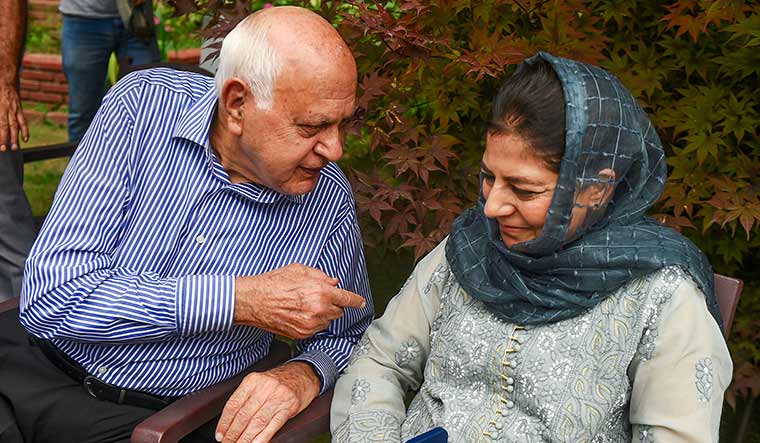AFTER THE SUPREME COURT upheld the abrogation of Article 370 on December 11 and ordered elections to be held in Jammu and Kashmir before September 30, 2024, the Gupkar alliance―made up of the National Conference, the Peoples Democratic Party, the Communist Party of India (Marxist) and the Awami National Conference―seems to be on shaky ground.
While NC vice president Omar Abdullah said he was going “off-grid”, his father and party president Farooq Abdullah, in a fit of frustration, said Jammu and Kashmir should “go to hell”. The sense of dejection was clear.
In the 2020 district development council elections―the first after the abrogation―the Gupkar alliance had won 110 of 278 seats across 20 districts. Within the alliance, the NC got 67 seats, the most, including 25 in Jammu, followed by the PDP (27), the People’s Conference (eight), the CPI(M) (five) and the J&K Peoples Movement (three). Two of those parties are no longer in the alliance. The BJP was the single-largest party (75), dominating in Jammu and winning three in Kashmir.
Since those elections, the BJP has made significant changes in Jammu and Kashmir through delimitation and constitutional amendments, bolstering the political influence of Hindu-majority Jammu. Before the delimitation, Jammu held 37 seats in the 87-member assembly; Kashmir had 46 and Ladakh, four. Now, Jammu holds 43 in the 90-member assembly; Kashmir has 47 and Ladakh is a separate Union territory.
These developments, which the Supreme Court backed, have made the opposition’s job harder, but observers said that a united front was still the best bet for the Gupkar alliance. Staying together would benefit them not only in Kashmir, but also in the Muslim-majority areas in the Jammu division, for instance in the Chenab Valley.
The NC seems to disagree. The party apparently feels that leaving the alliance could serve it better in the Lok Sabha elections and the assembly polls to follow. The party’s confidence stems from the fact that it has remained largely unscathed by the shakeup that the abrogation caused. On the contrary, the PDP, its main rival, has suffered serious setbacks. Many of its leaders, some of whom joined the party in the 1990s, have moved on. A lot of its supporters were miffed by the handling of the agitation sparked by the killing of militant commander Burhan Wani in 2016.
Critics also cite the PDP’s alliance with the BJP in 2015 as the reason for the revocation of Article 370. On November 26, Omar, who was Union minister of state for external affairs in the Atal Bihari Vajpayee government, brought this up at a rally in Bandipora. “If the PDP had accepted our support to keep the BJP away from the corridors of power, the decision of 2019 could have been averted,” he said. “The unfortunate tie-up cost the entire region its unique constitutional position, pushing its people to the wall.”
The feeling in the NC is that persisting with the Gupkar alliance could inadvertently aid the survival of the PDP and damage its own prospects. There were similar sentiments during the DDC polls, too. “There was this perception that a collaboration would favour the PDP, especially during its lowest phase,” a senior NC official told THE WEEK. At the time, though, the circumstances were dire enough for the party’s top leadership to decide on a unified front, he said. “Despite the alliance, numerous workers from both parties refused to support each other’s candidates,” he added.
As for the upcoming Lok Sabha elections, the NC reportedly does not want to allocate any seats to members of the INDIA alliance in the Kashmir valley. During the alliance’s last meeting, Omar proposed that the seats already held by the INDIA alliance members should not come up for discussion, and talk of seat sharing be limited to seats held by the BJP and others. In the 2019 Lok Sabha elections, the NC had won all three seats in Kashmir; the BJP clinched the remaining three―two in Jammu and one in Ladakh.
The PDP, on the other hand, has hinted that it wants to team up, but has not explicitly endorsed a pre-poll alliance. Said Sartaj Madni, senior PDP leader and head of the party’s parliamentary board: “I strongly believe in uniting for a greater cause.” He reiterated the significance of the Gupkar alliance and credited PDP president Mehbooba Mufti for orchestrating its formation. “Mehbooba stands firmly with the alliance,” he said. “We are committed to safeguarding its unity. We seek unity among all residents of Jammu and Kashmir for a shared goal.”
However, some of the PDP’s hardcore supporters are even prepared to go it alone. “We cannot erase the impression from people’s minds about our alliance with the BJP,” said party state secretary Bashir Ahmed Mir. “But there are many things that the PDP did to improve people’s lives, and that will not be forgotten.” He said the party’s cadre was intact, but acknowledged the lack of good candidates.
Sources said the PDP was working on a revival plan, drawing on its support base in south Kashmir. Also, observers said that Mehbooba has confronted the BJP and its Kashmir policies better than other leaders, which has boosted supporters’ morale.
Apart from the PDP, the Congress and the CPI(M) have also advocated for a united stand in Jammu and Kashmir. Smaller parties such as the National Panthers Party and Dogra Swabhiman Sangathan are also in.
The BJP, on the other hand, might not be wildly popular in the valley, but a few smaller parties in the region are open to cooperating with it. Their support could be crucial for the BJP to upset the regional applecart.
A lot, however, depends on what the Abdullahs do.


